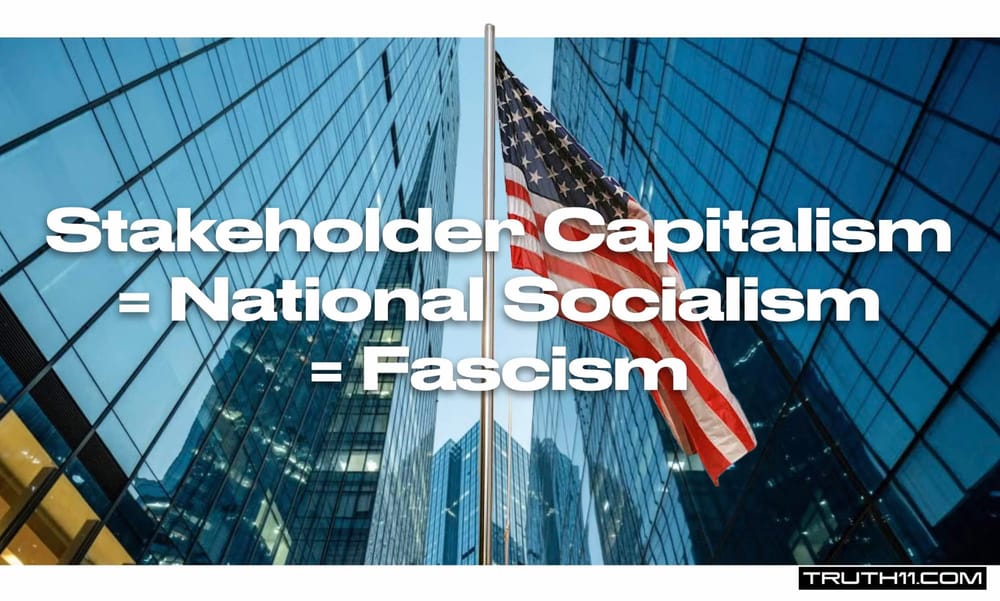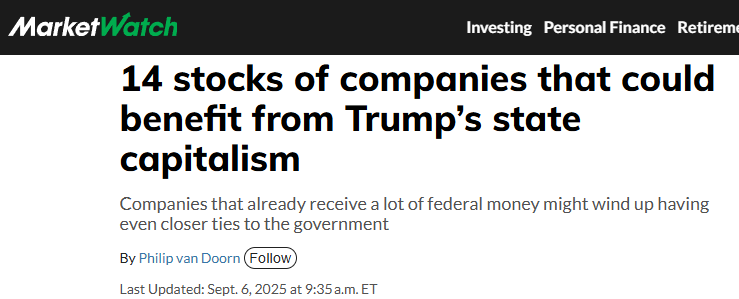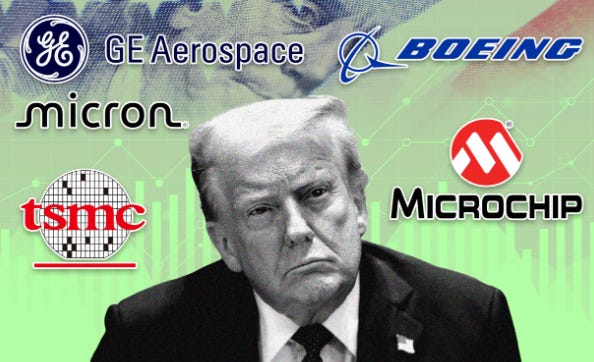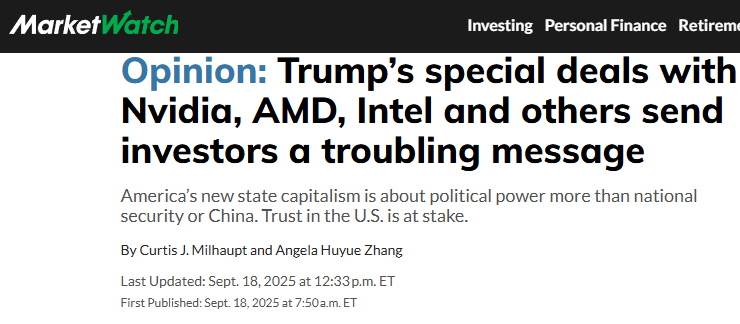Stakeholder Capitalism = National Socialism | Which, There Is A Word For That: Fascism

The WinePress | substack.com/@thewinepress
Trump Plans To Take More Stake In AI, Energy, Pharma Corporations Ahead Of Midterms Amidst Public-Private Convergence.
Interestingly enough, following the equity stake deal with Intel in August, it was also revealed that Intel partnered with a sanctioned Chinese company that specializes in facial recognition. Winning.
The public and private sectors continue to coalesce under President Donald Trump, and administration officials signaled last week that the White House is looking into taking a larger equity stake in more companies - furthering the stakeholder capitalism model in the country, a model favored by the World Economic Forum (WEF).
To review: in August, the then Department of Defense took a quiet yet “unprecedented” (in the words of Bloomberg) equity stake “in the little-known U.S. rare-earth producer MP Materials Corp. — a deal that would make the Pentagon the company’s largest shareholder.”
But the most headline-grabbing investment came when the Trump administration took a 10% stake in struggling chipmaker Intel, providing the government with a seat on the board to make decisions within the company. Trump tried to claim that he bought the stake for free (even though the Intel press release said the U.S. paid $8.9 billion), was happy to see the stock rise, and said he would readily do more deals similar to this in the future.
Days later, Commerce Secretary Howard Lutnick revealed the administration is having “monstrous discussions” to purchase stakes in defense contractors such as Lockheed Martin, among others.
More recently, the White House helped broker a TikTok deal via executive order, “in which TikTok’s U.S. application would be operated by a new joint-venture company based in the United States, is a “qualified divestiture,”” the fact sheet says. Oracle, Silver Lake and Abu Dhabi’s MGX, are the main investors and will control around 45% of TikTok USA, per CNBC. The press release says:
- It will be majority-owned by U.S. investors, operated in the U.S. by a board of directors with national security and cybersecurity credentials, and subject to strict rules to protect Americans’ data and our national security.
- ByteDance will hold less than 20% of the stock as required by law, choose only one director of the seven-seat board, and be excluded from the company’s security committee.
- Oracle—one of the nation’s leading technology companies—will act as TikTok’s security provider and independently monitor and assure the safety of all operations in the U.S.
Last week, Trump announced “TrumpRx,” a website that will deliver drugs for cheaper to the U.S. Medicaid insurance program with its first partner being Pfizer. However, as The WP noted, Pfizer had filed a trademark last year that indicated Pfizer was already seeking to implement this cheaper, direct-to-consumer model, indicating that the White House deal is really just branding and the administration skimming off the top, though nonetheless represents a further collaboration between the public-private sectors.
Trump and the administration indicated that more companies will soon join TrumpRx. Centers for Medicare & Medicaid Services CMS Dr. Mehmet Oz revealed during the media release that “we have much more to come. You'll be hearing breaking news from the President for the rest of the fall.”
The following day, marking the first day of the government shutdown, it was revealed that the administration took state in a lithium mining company in collaboration with General Motors. The government is taking 10% total in the company.
Per a press release from the Department of Energy (DoE),
“Secretary Chris Wright today announced the Loan Programs Office (LPO) has restructured its deal with Lithium Americas Corp. (LAC) with support from General Motors (GM) to further protect taxpayers and solidify the launch of the only domestic source of lithium carbonate here in America.
“The new terms provide the U.S. Government with 5% equity ownership in the form of LAC warrants as well as an additional 5% ownership in the form of warrants in the LAC/GM joint venture. LPO utilizes warrants as part of the overall collateral package on a loan, helping to reduce repayment risk for taxpayers. DOE was able to work with both parties to ensure greater loan resilience. The revised agreement includes robust loan amendments as well as more than $100 million of new equity.
“The U.S. Government’s stake in the project delivers on President Trump’s agenda to better steward taxpayer dollars, and ensures the project will go forward, spurring the creation of manufacturing jobs and securing our nation’s access to the largest confirmed lithium deposit in North America.”
In addition, in an exclusive report published over the weekend, Reuters says administration officials are reaching out to companies across 20-30 different industries; from pharma, to AI, to rare earths, energy and more.
Reuters wrote:
The Trump administration is pursuing deals across up to 30 industries, involving dozens of companies deemed critical to national or economic security, according to more than a half dozen people familiar with the talks.
In some cases, the administration is offering tariff relief in exchange for concessions, revenue guarantees, or taking equity stakes in troubled companies, among other types of help. The fast-paced dealmaking is designed to deliver political wins for U.S. President Donald Trump before the 2026 midterm elections, the sources said.
The plan is to use the broad powers of government to push companies to further Trump’s goal of moving manufacturing to the United States, reducing dependence on China, strengthening supply chains for critical products, and contributing to the government’s coffers, according to six people familiar with the discussions.
Administration outreach has touched disparate corners of the economy including semiconductors, AI, quantum computing, critical minerals, ship building, energy, battery production, pharmaceuticals and freight, the sources said.
Taken together, the planned interventions in the American economy reverse decades of hands-off approach to private enterprise, a defining feature of American capitalism.
“It’s amazing that a Republican administration is taking us farther away from traditional capitalism than any other Democratic administration,” said John Coffee, professor of corporate law at Columbia University in New York.
Two anonymous sources said the administration is looking towards the International Development Finance Corporation, an often overlooked government agency, to oversee and finance these new deals. Congress is considering passing a bill that expands on a bill passed in 2018 that would allow the administration to snap up pretty much anything "in the economic and national security interests of the United States," according to a copy of the plan, Reuters says.
One executive in the critical minerals industry said his colleagues are "afraid that we walk into a meeting about loans or grants and they say: 'We need 10% of your company.'”
A number of administration officials are working to establish deals. Howard Lutnick especially is one of them, as he was critical in securing the Intel deal and a “golden share” as per the $14.9 billion dollar deal with Japan’s Nippon Steel after it acquired US Steel in June.
Others, such as Chief of Staff Susie Wiles, who has vast connections among those in the pharmaceutical industry, is ringing-up a ton of big-pharma corporations. In a since-deleted post, The Kennedy Beacon highlighted her many connections to big-pharma, writing:
Wiles became co-chair of lobbying firm Mercury Public Affairs in February 2022.
As highlighted by Wholistic News, Mercury’s clientele includes Pfizer; Gavi, the Vaccine Alliance, which spearheaded vaccine funding and distribution efforts during the COVID-19 crisis – a role also played by the United Nations Foundation, another Mercury client; and Gilead Sciences, developer of the equally-rushed COVID-19 “therapeutic,” remdesivir, as critiqued in Science.
But there are critics of the administration’s approach.
Some are concerned about making business decisions based on policy that might change in three years.
“The No. 1 concern is this may be short lived,” said Y. David Scharf, chairman and co-managing partner of law firm Morrison Cohen, which he said is representing some companies in talks with the U.S. government. “Is there an unwind that has to happen if there is a 180-degree opposite view in the next administration?”
Critics say such an intrusive foray into the private sector could upset the nation’s free-market ethos and put the government in the role of picking winners and losers.
“It’s contradictory to have free-market champions now backing the same state-driven model they used to criticize,” said Aldo Musacchio, expert in state capitalism and author of books including “Reinventing State Capitalism.”
The administration sees the equity stakes not as ideological reversals, but as pragmatic tools to de-risk strategic sectors, ensure taxpayer value and restore U.S. manufacturing jobs, three sources told Reuters.
When the administration touted the Intel deal in August during Trump’s cabinet meeting, Lutnick said the deal - without being questioned about the deal directly by reporters - is “not socialism but capitalism.”
“So it’s not socialism. This is capitalism.
“If you give someone $11 billion who’s just building an America, they’re not doing something special. They’re building in America and their CEO told the president he didn’t need the grant. And you said, ‘Well, then why don’t we get something for it?’ So, it’s amazing.”
Later that night, Lutnick defended the Intel deal and other future deals on Fox News with Laura Ingraham.
Lutnick argued that the U.S. has continued to hash out grant money for many years and received nothing in return, so this administration is pivoting and with the Intel deal, and more to come, “at least the U.S. gets the benefit of the bargain.”
Ingraham brought up Sen. Paul’s socialist remarks and Lutnick claimed that he “has got it backwards.” He argues that when the Biden administration gave $11 billion last year to Intel as a grant that is “beyond socialism,” Lutnick contended.
“C’mon, let’s take care of the American taxpayer. How about you give us the equity equal to that amount of money? That just sounds fair and smart.
“That is not socialism. I’ll tell you what that is: that’s the best businessman in the [U.S] in the Oval Office doing fair things for us, the American taxpayers. Look, I helped [Trump] structure the deal, this is exactly what we’re supposed to do, get the benefit bargain.”
During his cabinet meeting, Trump blamed “fake news” for the socialist claims and called the deal the “American way.”
“I was criticized by some of the fake news media. ‘That’s not the American way.’ Actually, it is the American way.
“Now, if I can help other countries or do those deals with I would do that. I think it’s great. It’s good. Builds up our balance sheet. Let me tell you, our country is becoming very rich again. You don’t see it.”
Nevertheless, the cat is out of the bag, and industry leaders and economists see it for what it is. In September, after it became apparent this approach was going to become the standard for this administration, MarketWatch listed a number of stocks that could receive a boost as the administration is on a mission to take stakes in all sorts of companies, calling this “state capitalism.”


The Intel deal has since expanded. In September, Nvidia announced a $5 billion investment in Intel to co-develop datacenter and PC chips, followed by a $2 billion injection from SoftBank. “Nvidia is investing its stake at a price of $23.28 a share, a release from the company said,” CNBC reported.

Interestingly enough, following the equity stake deal with Intel in August, it was also revealed that Intel partnered with a sanctioned Chinese company that specializes in facial recognition.
Biometric Update wrote at the time:
It’s a classic case of tech company partners with foreign company, government sanctions foreign company for rights abuses, government buys a stake in sanctioned company’s partner.
Forbes reports that it has discovered Intel has a partnership with video surveillance provider Univision, which was added to the sanction entity list last year. Uniview has requested its inclusion on the list be reviewed.
The American company’s Chinese-language website also references partnerships with security camera giant Hikvision and Cloudwalk, both of which were already on the entity list for aiding the suppression of China’s Uighur minority with targeted facial recognition tools. Hikvision, like Intel, touts a partnership between the two companies.
Hikvision has also been singled out as a security threat in the UK, being referred to as “digital asbestos” for its largely unobserved prevalence in government buildings by former Biometrics and Surveillance Camera Commissioner Fraser Sampson, and in Canada.
If Lutnick (Epstein’s next-door neighbor) and Trump have to tell you that it isn’t socialism, then you KNOW that it absolutely is national socialism; which, there is a word for that: Fascism.
State capitalism, in my opinion, does not tell the whole truth. It should, in my view, be called stakeholder capitalism, as championed by the WEF and the likes of BlackRock - CEO Larry Fink becoming the co-chair of the WEF in place of Klaus Schwab; Fink, who is great friends and ally of Trump.
Stakeholder capitalism, as I have covered before, is the WEF’s ideal economic model per their Great Reset, which involves global interlocking public-private deals like what we are seeing with the current Trump administration. The media partially point out the hypocrisy (especially considering these deals are coming from the administration and party of "limited government” and “fiscal responsibility,” we are told), but are not made privy to the whole truth.
Even the nature of tokenization, something I have covered extensively, is inherently stakeholder capitalist. In a since-deleted article written by megabank BNY Mellon in 2022, the bank said the quiet part out loud:
“Tokenization’s importance stretches far beyond investment access; it could also facilitate new investing models. Currently, most investments leverage shareholder capitalism, striving to optimize profits and share price. For example, when you buy a company’s stock, you provide money in exchange for a share, but how the company is run and governed is largely outside of your direct control. Since tokenization leverages smart contracts, it could manage both the financial investment as well as facilitate the voting and/or ownership rights associated with the investment. There is a possibility of incorporating a stakeholder capitalism model, a popular management theory in the 1950s and ‘60s that promoted benefits provided to the wider community, not just shareholders.”
So, yes, the Trump administration is full-on globalist and stakeholder capitalist.
Ecclesiastes 5:8 If thou seest the oppression of the poor, and violent perverting of judgment and justice in a province, marvel not at the matter: for he that is higher than the highest regardeth; and there be higher than they.
Proverbs 29:2 When the righteous are in authority, the people rejoice: but when the wicked beareth rule, the people mourn.
And this is just the tip of the iceberg. Let’s not forget how big-tech executives from Palantir, OpenAI and Meta were made into Lt. Col., a rank that is baseline to enter the Pentagon.
It’s comically sick. If this was Biden/Harris, the MAGA hats would be apoplectic and irate, and rightfully so; but when Orange Grimace does it, there are crickets and perhaps even some cheers. Oh, but silly me, I forgot: Trump is playing 20-D chess and he’s draining the swamp, and we just can’t see the plan. How foolish was I to ever question Agent Orange?!
Where’s our dividend shares, where’s our stock options, where’s our rebates? Did you catch the language Reuters reported? “Revenue guarantees.” ‘This will make us a lot of money: I love it when the stock market goes higher,’ said Don to his fellow Soviet comrades. But that’s why it’s called stakeholder capitalism, as the pedo party in charge salivates over those gains…
Their day cometh…
Proverbs 22:16 He that oppresseth the poor to increase his riches, and he that giveth to the rich, shall surely come to want.
Proverbs 28:22 He that hasteth to be rich hath an evil eye, and considereth not that poverty shall come upon him.
Original Article: https://thewinepress.substack.com/p/stakeholder-capitalism-trump-plans
Related:






Comments ()